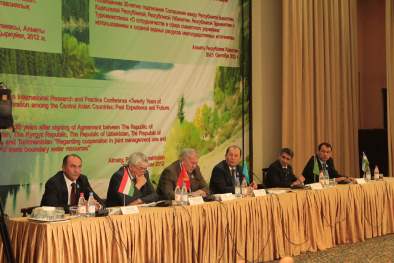The most challenging issues in the Caucasus are poor water supply and sanitation, degradation of ecosystems, floods and, in some areas, water scarcity. Transboundary issues are common to all CACENA countries.
Over the years, cooperation between the countries has had an important impact on the management of water resources which was highlighted by several speakers. A presentation by Nariman Kipshakbaiev, Chair of GWP Kazakhstan and a former Kazakh minister of water resources and one of the founders of the ICWC, provided a complex assessment of strengths and weaknesses of transboundary cooperation. Prof. Kipshakbaev demonstrated expectations from previous Aral Sea Basin Programs which for different reasons were not fully achieved. He suggested directions for future activities which could find political support and commitment in 2012-2016.
Three round tables after the plenary sessions were devoted to improvements of legal instruments for cooperation, implementation of IWRM, and a session led by GWP Central Asia and Caucasus with Coordinator Vadim Sokolov as the moderator on water and energy security in Central Asia.
Presentations included:
- Presentation of the model Basin Economic Allocation Model (BEAM) which aims to explore whether it may be possible to change existing water allocation patterns in ways that enhance overall welfare in the Aral Sea Basin. Mr. Sorokin presented different scenarios of water allocation across time and space to different uses (with five economic sectors assessed) so that the economic value of water use is maximized. The BEAM model centers around the three Es (effectiveness, efficiency and equity) when dealing with the allocation of water. The main client of the BEAM model is the International Fund for Aral Sea Saving (IFAS) for supporting future investments in the basin.
- Analysis of legal instruments to implement IWRM in the Aral Basin
- Specifics of practical IWRM implementation in Uzbekistan
- Overview of GWP activities in Tajikistan, Turkmenistan, Georgia, Armenia and Azerbaijan
- Transboundary cooperation in Kura-Araks basin in Caucasus
- Results from the Astana process – contribution of IWRM in green growth
- Dissemination of knowledge on IWRM through the GWP Network
- New Geo-Information system in Kazakhstan presented by a private company

